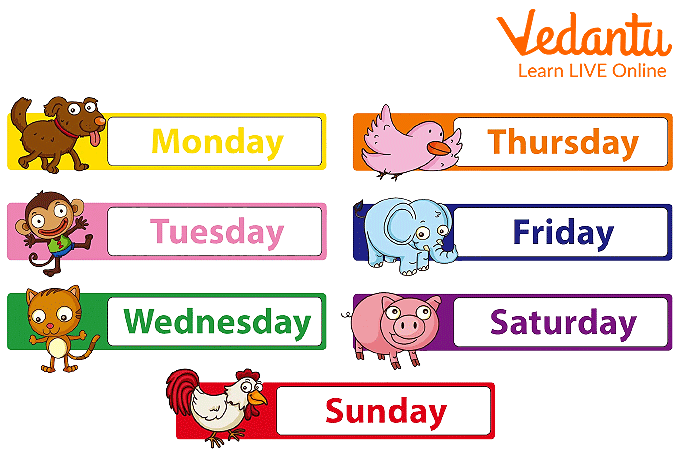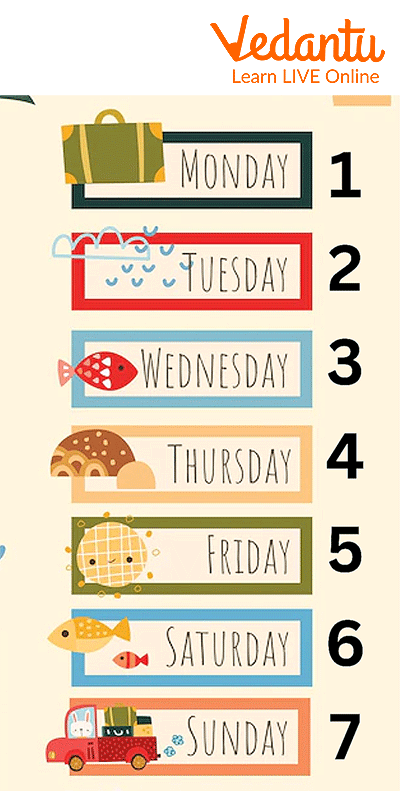




What Are the Days of the Week? Names, Order & Quick Facts
It's Monday tomorrow! We are going to meet our friends after a month’s vacation. Friday night means dinner in a restaurant! This is how significant days can be for kids. They wait for special treats and events in their daily lives and count days. To count days, one has to learn the number of days in a week in a calendar.
Seven Days in a Week
The weekdays are an important unit to measure time. Kids, at a very young age, learn to count the days and months first. They understand the meaning of tomorrow, today, and yesterday and then proceed to learn the day after tomorrow, etc.
To make it more convenient, they need to learn the numbers and names of days present in a week. Let us find out the names of days and their meanings first in a sequence we follow across the world.
Monday: It comes from Moon Day which means lunar day.
Tuesday: It is taken from the Norse God Týr and comes from ‘Tiw’s Day’.
Wednesday: It is derived from the name Wōdnesdæ. It is an old name of Odin. Hence, it is called the day of Odin, another god.
Thursday: This name is derived from Thor, a Norse God. Hence, it comes from Thor’s Day.
Friday: This name is derived from Frigg, another Norse God. It is derived from Frigg’s Day.
Saturday: It is derived from the name Saturn, a planet in our Solar System. It comes from Saturn’s Day.
Sunday: It comes from the name Sun and is derived from Sun’s Day.

Days in a Week
These are the names of the days in a week. We start a week on a Monday and go to school to learn new things. It ends when the clock ticks 12 AM at night. The next day, Tuesday, begins after 12:00 AM. Similarly, Monday begins after 12 AM midnight on Sunday.
Days and Week Rule
The cycle of days is simple. After Sunday, Monday comes and a new week begins. The routines for kids and adults are set by following this week's rule.
Every week begins on Monday and ends on Sunday. There are 5 weekdays starting from Monday and Sunday every week. Saturday and Sunday are weekend days.
Songs to Learn and Remember Days of the Weeks
One of the easiest ways to teach kids about the days of the week is:
Sunday, Monday, Tuesday too.
Wednesday, Thursday just for you.
Friday, Saturday that's the end.
Now let's say those days again!
Sunday, Monday, Tuesday, Wednesday, Thursday, Friday, Saturday!
This song can be sung following the tune of ‘Twinkle, Twinkle Little Star’. It is catchy and the rhythmic presentation of the days following the sequence will help kids memorise easily.

Sequence of Days in a Week
Importance of Learning Seven Days Name
Once kids start going to school, they will have to understand that there are seven days in a week. It is then they will develop a concept of time and follow a routine. Kids will learn to organise a proper schedule and follow it for physical and mental development.
Learning days will help them realise the sequence of days in stories and books. They will be able to follow the phases of stories and chapters and will be able to enjoy more. The use of days’ names can be seen in various subjects apart from English. Hence, learning the days’ names is very important.
They will also learn to see a calendar and understand the concept of time with bigger units.
Tips for Parents
Explain the days of the week with a song. Let the kids enjoy the gestures to grab the concept of days, tomorrow, today, and yesterday. It will also help kids to learn to count. Use images to explain what these days are.
FAQs on Days of the Week: Names, Order & Easy Learning Guide
1. What are the seven days of the week in the correct order?
The seven days of the week in their correct order are:
Monday
Tuesday
Wednesday
Thursday
Friday
Saturday
Sunday
A week always follows this same sequence of days.
2. Which day is considered the first day of the week?
Monday is widely considered the first day of the week, especially for school and work schedules. It marks the beginning of the typical workweek after the weekend.
3. What is the difference between 'yesterday', 'today', and 'tomorrow'?
These terms help us understand the order of days:
Today is the present day, the day you are in right now.
Yesterday was the day that came just before today.
Tomorrow is the day that will come right after today.
For example, if today is Wednesday, then yesterday was Tuesday, and tomorrow will be Thursday.
4. What are some fun examples of activities to remember the days of the week?
A fun way to remember the days of the week is by singing a rhyme or a song that lists them in order. You can also create a weekly chart and draw a picture of something you do each day, for example, drawing a school on Monday or a park on Saturday. This helps connect each day's name to a real-life activity.
5. Why are Saturday and Sunday often called the 'weekend'?
Saturday and Sunday are called the weekend because they are at the end of the week. For most students and working people, these two days are holidays, a time for rest, play, and spending time with family before the next week begins on Monday.
6. What is the importance of knowing the days of the week?
Knowing the days of the week is very important for organising our lives. It helps us understand our school timetable, know when holidays or birthdays are coming, and make plans. For example, knowing it's Friday helps you know that the weekend is next!
7. How can we use the days of the week to talk about our plans?
You can use the names of the days to explain when things happen. For example, you can say, “On Tuesday, I have my drawing class,” or “We are going to the zoo on Sunday.” This makes it clear to everyone what your schedule is.















